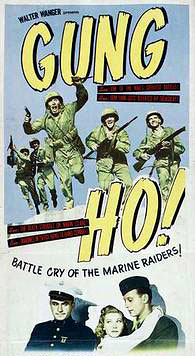 |
| Poster of a film titled with the newly-popular phrase "Gung ho!" (Wikipedia) |
Note: Would you rather have a "golden parachute" or "get the old heave-ho"? In this lesson and #01-074, we'll learn some idioms often used in business.
Get Ready: How would you tell someone he or she is fired? Have you ever been fired?
Let's look at some idioms that might be used in business situations, or even in everyday conversation. Read the dialogue, taking note of the underlined words. Then do the Practice below, check your answers in the first Comment, and read the Explanations.
A manager is scolding a member of his sales team:
Look, Andy, I hired you because you seemed pretty gung-ho, but lately I've had to throw most of your sales reports into the circular file. I'm not on an ego trip or anything, but this kind of bush-league performance will never earn you a golden parachute. In fact, another evaluation like the last one and we may have to eighty-six you--you know, give you the old "heave-ho"!
We'll look at a few more expressions in Lesson #01-074.
--------Read more: https://en.wikipedia.org/wiki/Gung_ho
Practice: Match the idiom to its meaning. After you check your answers in the first comment, read on for Explanations about each one.
- bush-league
- circular file
- ego trip
- eighty-six
- golden parachute
- gung ho
- heave-ho
- waste basket
- to "give [someone or something] this" is to get rid of [someone or something]
- high-level benefits package
- eliminate; get rid of
- very aggressive
- mediocre; not up to expectations
- self-centered behavior
Answers are in the first comment below.
Explanation of the Answers: After you check your answers in the first comment below, read on for more information on these idioms.
- bush-league: This has nothing to do with any American presidents; actually it's related to baseball. "Bush" here refers to "the countryside." If you were a mediocre ball player, you wouldn't be in the major leagues; you'd be in a "bush league," playing outside of the major cities. So now we say things like, "Most of the sales force is very effective, but Bill's really bush-league."
- circular file: This is a humorous reference to a trash can or waste basket, most of which are round. "Hey, boss, what should I do with this advertisement from our vender?" "Put it in the circular file."
- ego trip: Ego simply means "I" or "the self." Everyone has an ego, and it generally is an OK thing. But some people are very self-centered, or selfish. We call them "egotistical." So when we meet someone like that, we can also say, "Wow, that guy's on such an ego trip."
- eighty-six: To eliminate. Originally, it meant that a restaurant had run out of something: "Hi, can I have a chocolate sundae?" "We're sorry, sir, the sundae has been 86'd." Later, it became more generally used as a synonym for "get rid of," as when a manager tells an assistant to fire someone: "Eighty-six that guy, would you?"
- golden parachute: Originating in the 1980s, this is part of the benefits package for a high-level manager, perhaps upon retirement, or even if he has to be fired. Properly called "termination benefits" or the like, it means that when you "jump out of the airplane," you won’t be hurt because your parachute--made of gold--will carry you down safely.
- gung ho: This means very aggressive: "That salesman is very gung ho; he's going to do very well here." As you might have guessed from the sound, many sources say it's based on a Chinese term. Some suggest gongye hezhoushe, or "industrial cooperative." They say that these work units were very hard working, almost unstoppable; an American Marine Corps officer noticed this and coined the term.
- heave-ho: Very different from "gung ho," like "eighty-six" it also means to throw something away, but this one requires a verb. When people did manual work together, they would often do a kind of chant to coordinate their actions. When throwing something, one of the chants they used went like this: the leader would shout "Heave!" (It means "throw.") And as the workers threw whatever it was--bags of seed, nets full of fish, etc.--they would respond "Ho!" Now we say things like, "Too bad about Fred; I heard his company gave him the old 'heave-ho.'"
Submitted to the Shenzhen Daily for February 18, 2008
This lesson received 243 visits on my old site between February, 2012, and July, 2021.


Answers to the Practice: 1. f; 2. a; 3. g; 4. d; 5. c; 6. e; 7. b
ReplyDelete